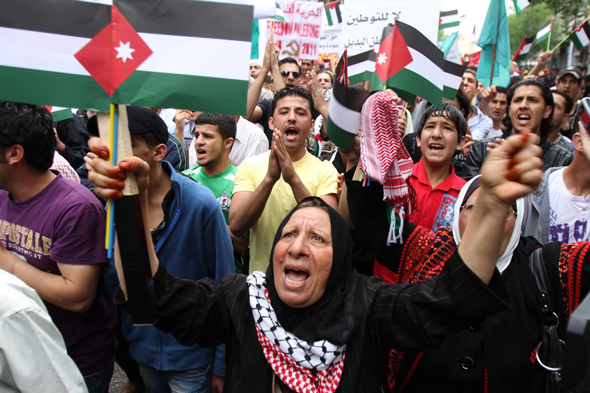
I won’t sum up the evolution and characteristics of the Arab Spring for you, you’re all aware of them. I won’t even enter into the debate on the term “Arab Spring” and its real meaning (at least, not now!). But I have to admit I really like the sound of it, especially when it’s used to add a new country to this encouraging domino effect movement, and that seems to be the case of Palestine. Nonetheless, this case presents a new surprising feature – It looks like one of the country’s leaders is actually supporting the uprising!! So who/what do the people go against (besides, as always, the Israeli occupiers)? Well, they are mainly demonstrating against the other visible authority – the Palestinian Authority.
A key meeting of the Arab League was held last week in Cairo during which Mahmoud Abbas addressed other Arab leaders by saying “The Palestine spring has begun and we are with what the people say and demand”. While I’m still trying to guess what he meant by “we” as half of the leaders in attendance remain unmoved by protests in their own countries, one of thing is for sure – Abbass should tread carefully. Abbas risks eroding the expression “Palestine Spring”, which he already used when asking for recognition of the state before the U.N.
So what exactly are the Palestinians asking for? The Palestinians’ primary objective is to move past the stalemate the country has been in for years. Last year, a deal was brokered by Egypt whereby Hamas and Palestinian Authority leaders would resume negotiations and hold free and fair elections in both Gaza and the West Bank. Conversations had been going on, but not at the pace desired by the people, and have yet to deliver any tangible results. Palestinians are aware they need reconciliation and unification if they are to take any kind of meaningful measure, be it unilateral or bilateral, regarding the conflict with Israel. This is particularly important as Israel is in no noticable hurry to talk peace. Above all, however, the economy in both the West Bank and Gaza in a pitiful state, and not only as a consequence of the occupation. For example, and according to one recent report by the United Nations Conference on Trade and Development (UNCTAD), food insecurity in the West Bank affects 66 per cent of the population. This adds to, amongst other issues, acute shortages of medicine and a recent hike in petrol prices in Israel.
The protests are mainly directed against Salam Fayyad, the Prime Minister. Why him? It all depends on the version of the story you listen to. I personally believe the poor democratic record of the PA has something to do with it. While some argue he has become the scapegoat of every bout of Palestinian dissatisfaction, Fayyad – a former IMF worker – has undoubtedly been the darling of Westerners for years. While securing Western aid and support, and despite years of close cohabitation, Fayyad has never really gotten along with Abbas. He is nowadays blamed for cutbacks to entitlements – the actual trigger for the demonstrations being the inability of the government to pay salaries to its employees. In view of the probable escalation, and after having explained part of his policies on his Facebook account, the PM has declared he is ready to step down, even though that won’t fix any material issue. He has, however, affirmed that this movement cannot be characterized as the arrival of the “Palestinian Spring” simple because “we will not reproduce the Arab Spring here, because we are not a state”.
As of today, Fayyad apparently counts on Abbas’ full support, who said on 9 September that “there is no disparity between the government and me: they follow my orders and I am committed to their policy development and recommendations”.
Now comes an idealist comment (sorry, Maria, that’s me): do you remember newspapers talked about an “Israeli Spring” last year (like The Economist)? Are the youths in both countries so different? They both fight for their rights, for a better position, for a peaceful living… Therefore they are not, and they surely wouldn’t find it so difficult to live together side by side. Why wouldn’t we then favour a “one state solution”, that is to say, one secular state granting equal rights to all citizens. Dream on…


